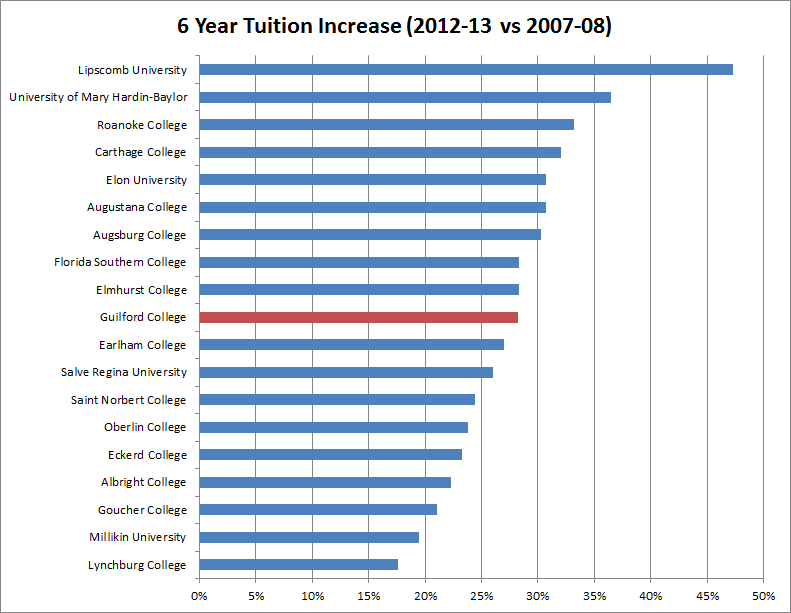Please feel free to comment here on issues relating to budget, budget cutting, and priorities during the budget planning process. If you want to communicate directly to someone, the faculty representatives to the President’s Cabinet are:
- Darryl Samsell (Chair of Budget Committee)
- Sherry Giles (Clerk’s Committee)
- Dave Dobson (Clerk, Budget Committee)
Other budget committee representatives are:
- Gwen Erickson (Budget Committee) – she has also attended one cabinet budget session.
- Vance Ricks (Budget Committee)
Here is a graph in response to Ben’s question in the comments below:

any feel for comparison of growth in tuition pricetag and discount as compared to our peers?
To follow up – I played around with some numbers from IPEDS, and our increase in tuition rate doesn’t seem out of line with our comparison schools. I’ve added a graph to the post above. I had a harder time getting at the discount rate from the IPEDS data – they report on student aid, but when I looked at the amount of institutional aid vs. cost Guilford reports there, it didn’t seem to match the internal numbers I’ve seen here in the Factbook, so I think I might not have selected the right variables on IPEDS (or maybe the right variables aren’t available). What I did find is that Guilford’s reported institutional financial aid grant amounts don’t seem to be increasing faster or slower than other schools.
Hi Dave–
Your comment makes me think that we could benefit from an informal faculty working group (preferably in coordination with Institutional Research) on accessing information in the IPEDS database. I can think of several faculty who have independently gone into the IPEDS database to gather information, and it might be good to share knowledge about effective methods for doing so. Plus I worry that there might be duplicated effort or that different faculty ask for similar data in slightly different ways and get slightly inconsistent answers. If there are items that faculty are commonly interested in seeing regularly updated data for (like Ben’s question or some of the questions raised at the forum), it should be possible to construct report templates that can be run periodically. All of this would give us a common knowledge base (some chunk of which Institutional Research may already be doing).
I had actually thought about discount rate when mining the IPEDS database for net tuition revenue information as part of the work on the faculty salary report. I think I convinced myself that a good estimate of discount rates could be generated if one was cautious about the IPEDS variables used and cross-checked (as you did) against other available data. I can share thoughts with you offline.
Rob
I think that would be really helpful, Rob. I’m not sure it should have committee status, but maybe a faculty data club or something?
Hi, Ben –
Our tuition increases have been similar to other institutions like us, as far as I know. That would be easy to check on IPEDS. I think the discount rate is harder to get at. I’m not sure if that’s reported in IPEDS, and one conversation I had with Andy Strickler made it sound like that kind of information is guarded pretty closely in some cases. I’ll have a look. Our students do consistently demonstrate greater need and receive more aid than those at other institutions.
Thanks to Dave, Clerk’s Committee, and all who were involved in making yesterday’s forum happen. Two thoughts.
1. I come down on the side of having more faculty and staff voices on the “cut committee” or “cabinet+” or whatever this group will call themselves (I’ll use “The Committee” for now). I’d actually like it to be Budget Committee, with supplemental members as necessary. Why else would we have a Budget Committee? But lacking that, the more people in the room, the better. I hope Clerk’s Committee will consider making a request for additional members on The Committee.
2. Not unrelated, can we stop assuming that “confidentiality” is a prerequisite for these discussions? Maybe the responses to academic prioritization in 2010, the 2011 budget cuts, and APSA in 2013 should be a sign that highly confidential processes do not lead to broadly accepted decisions in our system of governance. Maybe The Committee could run meetings open to observation by anyone, going into closed session only for a clear and limited set of reasons. Maybe the entire detailed budget could be available for community review and understanding (I’d include salaries, but I understand why many wouldn’t). How could it be any worse than what we’ve tried before?
(And full disclosure on the second point: I strongly believe in the concept of academic prioritization, particularly the idea that the college’s academic budgeting priorities should be clear and public, understanding that there will never be complete agreement on those priorities. I was involved in the process from the very, very beginning as chair of Educational Policy Committee and later as a member of the prioritization committee. My reflection on that experience is part of the underpinning for my comments here. I will note that the 2010 academic prioritization was based to a large extent on data from 2008 and before and therefore should have no place in this current discussion of potential cuts and restructuring.)